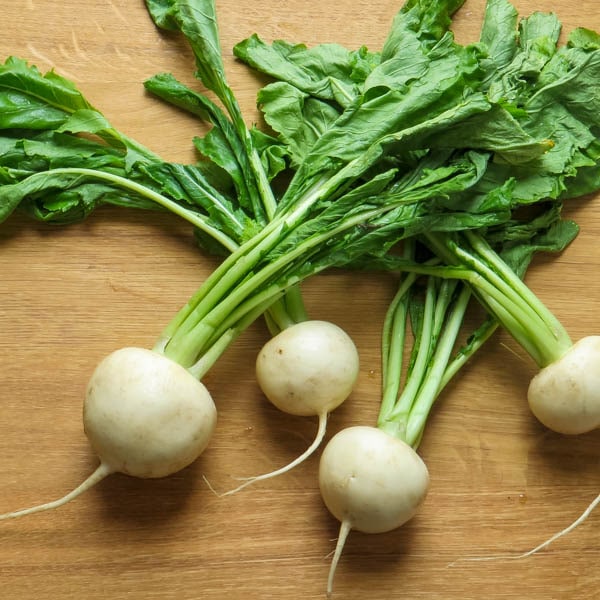Turnips
Turnips are root vegetables that belong to the Brassica family. They have a white or purple skin and a crisp, white flesh. Here’s the information you requested:
Turnips meaning in Urdu:
Turnips are known as “shaljam” in Urdu.
Turnip scientific name:
The scientific name of turnip is Brassica rapa subsp. rapa.
Turnip origin:
Turnips are believed to have originated in Europe and Asia.
Turnip family:
Turnips belong to the Brassicaceae family, also known as the mustard family or cabbage family.
Turnip benefits:
Turnips are a nutritious vegetable that offers several health benefits. They are low in calories and high in fiber, vitamins, and minerals. Some of their benefits include providing antioxidants, supporting digestive health, boosting immune function, and promoting healthy bones.
Turnip side effects:
Turnips are generally safe to consume, but excessive intake may cause digestive discomfort in some individuals. It’s important to note that some people may be allergic to turnips or have an intolerance to them. If you experience any adverse effects after consuming turnips, it’s best to consult a healthcare professional.

Can raw turnips make you sick?
Raw turnips are generally safe to eat, but some people may find them difficult to digest. Cooking turnips can make them easier to digest and enhance their flavor.
Turnip root type:
Turnips are classified as a taproot vegetable, as the edible part of the plant is the enlarged, bulbous root.
Turnip uses:
Turnips can be used in various ways, including:
Culinary uses: Turnips can be cooked in various ways, such as roasting, boiling, steaming, or sautéing. They can be used in soups, stews, stir-fries, and vegetable dishes.
Salads: Raw turnips can be sliced or grated and added to salads for a crunchy texture and slightly peppery flavor.
Pickling: Turnips can be pickled to preserve them and add tanginess to dishes.
Animal feed: Turnips are sometimes used as fodder for livestock.
Turnip health benefits for the brain:
Turnips contain antioxidants and nutrients that may support brain health. The antioxidants help protect brain cells from damage caused by free radicals. Additionally, turnips are a good source of vitamin K, which is important for cognitive function.
Are turnips good for weight loss?
Turnips are a low-calorie and low-fat vegetable, making them a good choice for weight loss. They are also high in fiber, which can help promote feelings of fullness and aid in weight management.
Turnip recipes:
There are numerous recipes that feature turnips, including roasted turnips, mashed turnips, turnip gratin, turnip soup, and turnip greens sautéed with garlic.
Turnips nutrition:
Turnips are a good source of vitamin C, vitamin K, folate, and potassium. They also provide dietary fiber and various antioxidants.
Turnip calories per 100g:
Turnips contain approximately 28 calories per 100 grams.

Turnip benefits in diabetes:
Turnips are a low-glycemic vegetable, meaning they have a minimal impact on blood sugar levels. They can be included as part of a balanced diet for individuals with diabetes. However, it’s important to monitor portion sizes and consider individual dietary needs.
Turnip benefits for skin:
Turnips contain vitamins A and C, which are beneficial for skin health. They provide antioxidants that help protect the skin from damage caused by free radicals and promote a healthy complexion.
Turnip for skin whitening:
There is no scientific evidence to support the use of turnips for skin whitening. Skin whitening is a complex process influenced by various factors, including genetics and overall skin health.
Are turnips good for your liver?
Turnips are a good source of antioxidants, which may help support liver health by reducing oxidative stress. However, it’s important to maintain a balanced diet and overall healthy lifestyle for optimal liver function.
Can you eat raw turnips?
Yes, raw turnips can be eaten. They have a crisp texture and a slightly bitter, peppery taste. However, some people may find them more palatable when cooked.
Turnips growing:
Turnips can be grown in cool climates and are often planted in the spring or fall. They prefer well-drained soil and require regular watering.
Turnips advantages and disadvantages:
Advantages of turnips include their nutritional value, versatility in cooking, and potential health benefits. Disadvantages may include a bitter taste when raw for some individuals and the possibility of digestive discomfort if consumed in excessive amounts.
Is turnip good for uric acid patients?
Turnips are considered a low-purine vegetable, which means they have a relatively low content of purines. Purines can break down into uric acid, so consuming low-purine foods like turnips may be beneficial for individuals with high levels of uric acid.
Is turnip good for high blood pressure?
Turnips are low in sodium and high in potassium, which may be beneficial for maintaining healthy blood pressure levels. Potassium helps balance sodium levels in the body and supports proper heart function.
Turnip health benefits:
Some of the health benefits of turnips include supporting digestion, providing antioxidants, promoting bone health, boosting immune function, and contributing to a healthy heart.
I hope this information is helpful!

